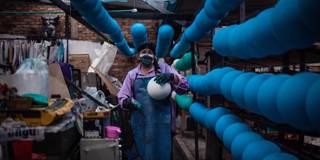As Argentina faces yet another standoff with its creditors, economists and policymakers should acknowledge that no one, including the IMF, has a compelling strategy to generate sustainable economic growth and prosperity. What Latin America needs is policies designed to improve people's lives, not prove some grand theory.
NEW YORK – The political economy of development in Latin America has long oscillated between statist populism and technocratic neoliberalism. The only constants seem to be unsustainable growth and debt crises, as Argentina’s current predicament shows. From a broader perspective, the key point is that whether one sides with the Argentine government or its creditors, no one, including the International Monetary Fund, has a compelling strategy to generate sustainable economic growth and prosperity.

NEW YORK – The political economy of development in Latin America has long oscillated between statist populism and technocratic neoliberalism. The only constants seem to be unsustainable growth and debt crises, as Argentina’s current predicament shows. From a broader perspective, the key point is that whether one sides with the Argentine government or its creditors, no one, including the International Monetary Fund, has a compelling strategy to generate sustainable economic growth and prosperity.